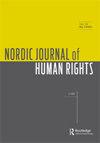引言:人权与世界遗产的复杂关系
IF 1.2
Q3 POLITICAL SCIENCE
引用次数: 0
摘要
在过去30年左右的时间里,人权学者和遗产从业者越来越关注保护和保存集体社会记忆(纪念碑、遗址、非物质遗产)的复杂性,以造福子孙后代。这种关注的形成方式日益确保遗产政策和做法符合或符合国际人权法及其最终目标:人类的最佳利益。我们如何理解这些同时结合和实施不同普及计划的理想项目?国际人权法的出发点是,所有人都是平等的,并通过分享尊严而实现平等;它把这一主张变成了当代国家社会唯一被允许的理由。与此同时,遗产工作者寻求履行联合国教科文组织的使命,即承认、管理、并在某些方面使人类文化中表达的普遍价值观永恒化——无论是个人的还是集体的,无论是物质的还是非物质的。这两个项目之间的交集导致了一种复杂而具有挑战性的关系,但也提供了一个富有成效的社会科学研究领域。对于社会科学家、哲学家和各个学科的研究人员来说,第一个挑战涉及“尊严”、“遗产”和“普遍价值”的多重含义。这些概念在一般情况下意味着什么,当被翻译成特定的遗产背景时又意味着什么?它们真的存在吗?它们有实际的后果吗?如果有,在什么层面上?如何发现后果,以何种方式确定后果?第二个问题涉及权利和遗产话语如何相交,以及结果如何。特别是,联合国教科文组织系统的基本文本中关于保护遗产的规定与国际和政府机构负责人实际命令其组织在实践中所做的事情之间的差异,已经成为人们不断关注和沮丧的根源。近年来,出现了许多以权利为导向的遗产倡议,以探索这一难题,弥合差距,并提供切实可行的解决方案。在人类学中,作为关注社会意义、关系和实践构成的社会科学的一个分支,开始探索建立普遍和永恒的一个合乎逻辑的方法是更仔细地研究具体的“文化人权”。这一权利同时是个人的和集体的,需要处理创造和享受这一权利的条件。遗产工作本身被广泛认为属于并表达了人类活动的文化领域。此外,它是一个由地方、国家和国际组织塑造的部门,尤其是联合国教科文组织,作为致力于文化整体,特别是遗产的联合国机构。在世界遗产领域,国际古迹理事会等组织本文章由计算机程序翻译,如有差异,请以英文原文为准。
Introduction: The Complex Relationship Between Human Rights and World Heritage
Over the last 30 years or so, human rights scholars and heritage practitioners have dedicated more and more attention to the complexities of protecting and conserving pieces of collective social memory –monuments, sites, intangible heritage – for the benefit of future generations. This attention has increasingly been shaped in ways that ensure the compliance or compatibility of heritage policy and practice with international human rights law (IHRL) and its ultimate objective: humanity’s best interest. How can we understand these aspirational projects that combine and implement different universalising schemes at the same time? IHRL takes as its point of departure the claim that all humans are equal and made so by virtue of sharing dignity; it turns this claim into the only permitted raison d’état for contemporary state societies. Heritage workers, meanwhile, seek to carry out UNESCO’s mandate of recognising, managing, and in some respects eternalising universal values as they are expressed in human culture – individually as well as collectively, materially as well as immaterially. The intersection between the two projects leads to a complex and challenging relationship, but also offers a fruitful field of social science investigation. For social scientists, philosophers, and researchers in various disciplines, a first challenge concerns the multiple meanings of ‘dignity’, ‘heritage’, and ‘universal value’. What do these concepts mean in general and when translated into specific heritage contexts? Do they really exist, do they have practical consequences, and, if so, on what level? How can consequences be detected, and in what way can they be anchored? A second question concerns how rights and heritage discourses intersect, and what the outcomes are. In particular, contrasts between what the foundational texts of the UNESCO system say about protecting heritage and what the heads of international and governmental institutions actually order their organisations to do in practice have become a source of constant concern and frustration. In recent years numerous rights-oriented heritage initiatives have emerged to explore this conundrum, bridge the gap, and offer practical solutions. In anthropology, as a branch of the social sciences concerned with the constitution of social meaning, relations, and practices, a logical way to start an exploration of establishing universals and eternals is to take a closer look at the specific ‘human right to culture’. This right is simultaneously individual and collective, and requires dealing with the conditions for its creation as well as for its enjoyment. Heritage work itself is widely perceived as belonging to, and being expressive of, the cultural domain of human activities. It is moreover a sector shaped by local, national, and international organisations, not least UNESCO, as the United Nations body dedicated to culture as a whole and heritage in particular. In the World Heritage field, organisations such as the International Council on Monuments and
求助全文
通过发布文献求助,成功后即可免费获取论文全文。
去求助
来源期刊

Nordic Journal of Human Rights
POLITICAL SCIENCE-
CiteScore
1.00
自引率
25.00%
发文量
29
期刊介绍:
The Nordic Journal of Human Rights is the Nordic countries’ leading forum for analyses, debate and information about human rights. The Journal’s aim is to provide a cutting-edge forum for international academic critique and analysis in the field of human rights. The Journal takes a broad view of human rights, and wishes to publish high quality and cross-disciplinary analyses and comments on the past, current and future status of human rights for profound collective reflection. It was first issued in 1982 and is published by the Norwegian Centre for Human Rights at the University of Oslo in collaboration with Nordic research centres for human rights.
 求助内容:
求助内容: 应助结果提醒方式:
应助结果提醒方式:


